Out of the 2,200 Palestinians killed in last summer’s assault on the Gaza Strip, over 80 percent were civilians. Nearly 150 families lost three or more relatives, with some families disappearing entirely. Activestills’ Anne Paq returns to Gaza to tell the story behind the numbers.
Photography: Anne Paq / Activestills.org, Editing: Shiraz Grinbaum / Activestills.org
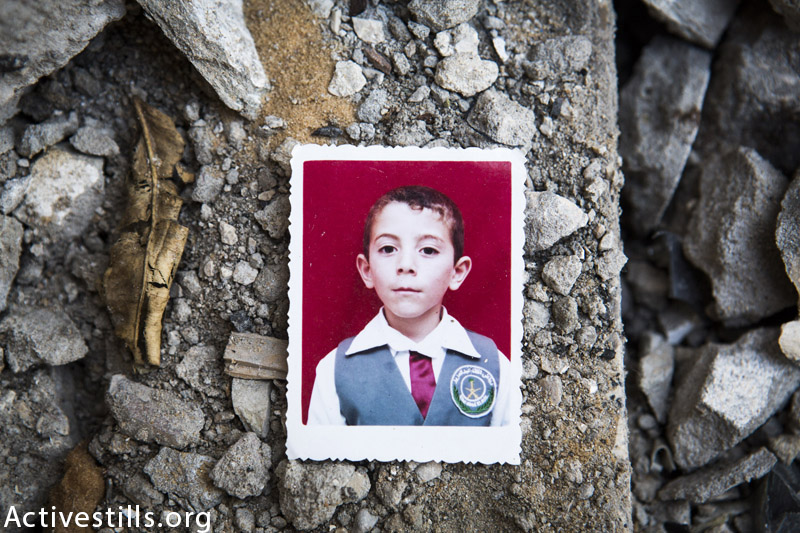
A photograph of Abdallah Abdel Hadi Al Majdalawi(13) in the ruins of his family home, Jabaliya, Gaza Strip, March 19, 2015. Abdallah was killed with two of his brothers and another two cousins during an Israeli attack that destroyed their two homes on August 3rd, 2014. (Anne Paq / Activestills.org)
“Time will reduce the pain, but we will not forget our brothers”, told me 18-year-old Ibrahim Al Khalili in the midst of the burned ruins of the family factory, when I visited them in November 2014.
The entire immediate families of Ibrahim’s brothers, Ashraf and Ahmed, were killed: Ashraf’s wife, Nedaa’ (28) and their children Deema (4), Ziyad (3) and Mahmoud (8); as well as Ahmed’s wife, Aya (23), and their daughter Lama (5). A big fire broke out in the factory due to the plastic and wood materials stored there. The bodies were burned so badly that when they arrived to the morgue they were burned beyond recognition.
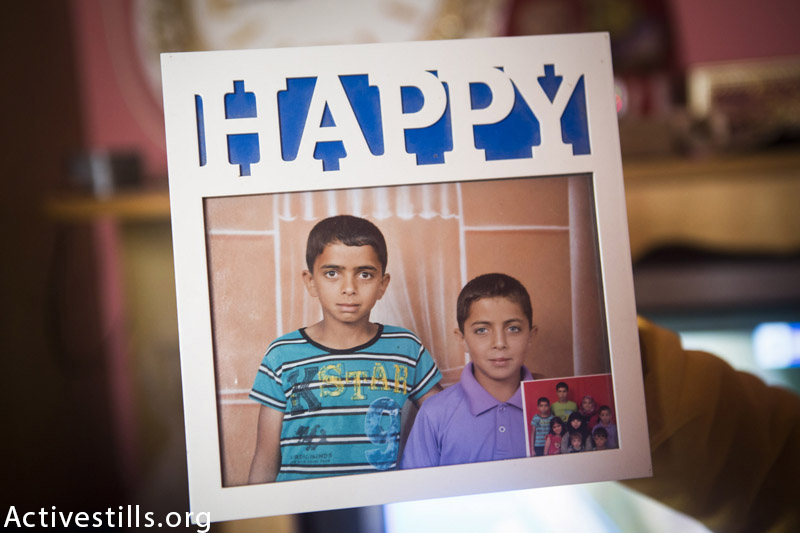
Framed photo of Ahmed Mustafa Zo’rob (15) and his brother Mohammed Mustafa Zo’rob (12), photographed in their home in Rafah on February 10, 2015. They were both killed on August 1st, 2014 during an attack on their uncle’s home, together with 14 other members of their family, including their mother and two other siblings. (Anne Paq / Activestills.org)
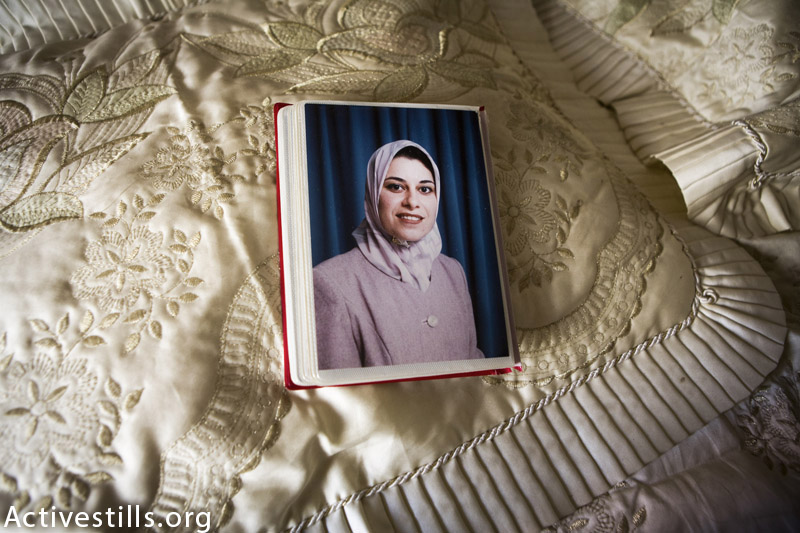
A photo of Taghrid Shabaan al Kilani is laid out on her bed in Beit Lahiya, Gaza Strip, September 18, 2014. Taghrid was killed together with her husband Ibrahim and their five children in an Israeli attack on the building to which they fled in Gaza City on July 21, 2014. Ibrahim and her children are German citizens; Ibrahim had lived in Germany for 20 years and was working there as an architect. They fled their home in Beit Layhia after the Israeli army dropped warning leaflets in their neighborhood, which urged the residents to go to Gaza City. (Anne Paq / Activestills.org)
The eight members were the last ones waiting to be evacuated when an Israeli soldier fired a shell that fell on them. Seven-year-old Mahmoud was the only person who wasn’t killed on the spot; he remained conscious and witnessed the death of his entire family. At the Shifa hospital he fell into a coma, and died four days later.
I was at the morgue of the Al Shifa when the bodies arrived. One carbonized arm, unable to bend, was sticking out of the green plastic bag where the bodies were put before being taken for burial. In another plastic bag, three bodies, the one of a woman and two children, were glued together.
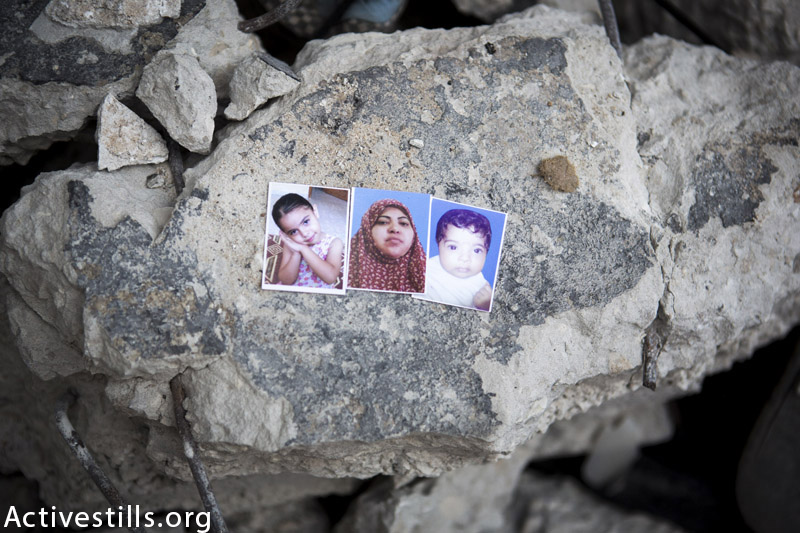
Photos of Aseel Mohammed Al Bakri (4), her mother Ibtisam Ibrahim Al Bakri (38), and her sister Asmaa (5 months), displayed in the ruins of their home, Al Shati’ refugee camp, Gaza City, September 11, 2014. They were killed by an Israeli attack on their home on August 4, 2014, with two other members of their family. (Anne Paq / Activestills.org)

Photos of 10 members of the Balata family seen in the ruins of the home of Abdel Kareem Balata, Jabaliya refugee camp, Gaza Strip, September 9, 2014. A total of 11 members of the family were killed, including 9 members belonging Naeem Balata’s immediate family. Naeem, his wife, and seven of their children were killed by Israeli shelling on his brother’s home on July 29, 2014. (Anne Paq / Activestills.org)
On that same day I stood outside the morgue and took a photo of Ismael, another Khalili brother, embracing someone while collapsing in tears. How can one forget such a scene of devastation? I tried to find out their names, and the location from which they arrived. Someone explained that this was the Al Khalili familiy from Al Tuffah. “They were unable to escape, and because of the factory, they were caught in the fire,” I was told, writing down the details. But in the chaos at hospital, flooded with constant flow of dead and injured, it was often impossible to even catch the family’s name.
The Khalilis were one of many families in the Gaza Strip that were obliterated last summer by Israeli attacks. According to the United Nations, 142 families lost three members or more in single Israeli strikes, a terrifying statistic. Some families, like those of Ahmad and Asfraf Al Khalili, were completely wiped out. Many families were gathered together during the offensive, which meant that any strike on someone’s home was even deadlier than usual, especially at night.

Photos (from left to right) of the killed siblings Mohammed (12), Yara (8) and Nadeen (16) Mahmoud Al Farra, held by their mother in their home in Khan Younis, February 22, 2015. Nine members of the Al Farra family were killed in the street by an Israeli missile while they were fleeing their home on August 1st, 2014. (Anne Paq / Activestills.org)
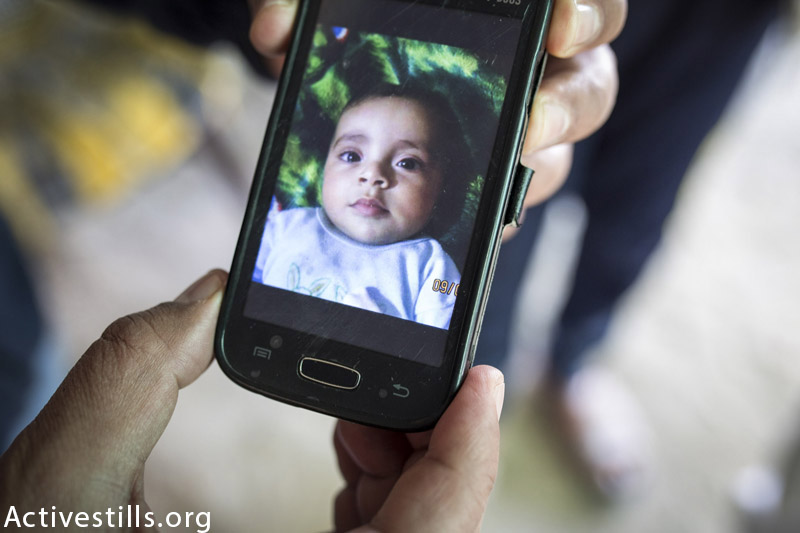
Photo of Abdel Hadi Hayyel Abu Dahrouj (2) on a mobile phone, shown on March 17, 2015 in Al Zawaida village, central Gaza. Abdel was killed on August 23, 2014 together with his entire immediate family — his father Hayyel (28), mother Huda (25) and his brother Abdullah (3). In total five members from the Abu Dahrouj family were killed in the Israeli attack. (Anne Paq / Activestills.org)
I went back to Gaza in September with the idea of documenting some of these families, starting with the ones I encountered during the summer. What happened to them? What remains of their memories, and how can the ones left behind go on with their life? What about the injured, the widows and the orphans left behind?
Long lists of names with ages of people was published, but I wanted to see the faces — to find the old photos from their photo albums. I wanted to get the stories out. I wanted these families to be remembered.
Read: What I learned touring the rubble piles of Gaza
Soon the project, called “Obliterated Families,” went beyond what I intended. In collaboration with Al Mezan Human Rights Center and, over the course of the following months, I visited and documented 50 families. Some may have lost a few loved ones, others, like the Abu Jame’ family, mourned the death of 25 members, of whom 18 were children. How can one cope with such immense loss?
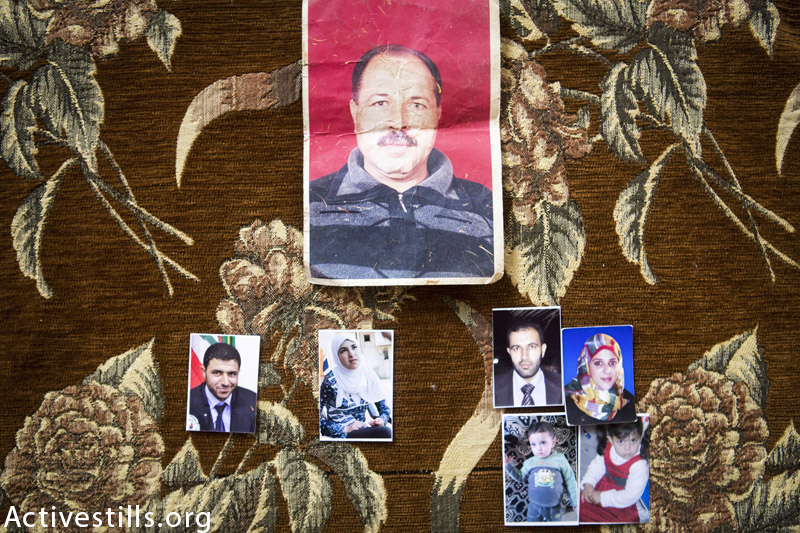
Photos of the seven members of Mohammed Atta Mahmoud Al Najjar’s family seen in the home of Mohammed’s brother, in Khan Younis, Gaza Strip, February 18, 2015. A total of eight members of his family were killed by an Israeli attack on his home on July 29, 2014. His entire immediate was killed: Atta (29); his wife Ibtisam (21) and their two children Mohammed (2) and Rafeef (3). Atta worked for the civilian police in Gaza. (Anne Paq / Activestills.org)
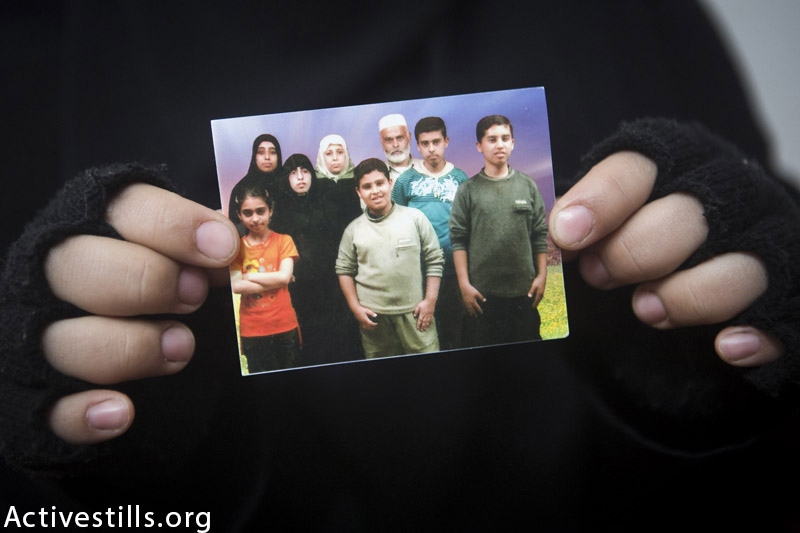
Photo of the Al Haj family held by Fida’a al Haj in their temporary home, Khan Younis refugee camp, February 18, 2015. Only two members featured on the photo —Yasser (26) and his sister Fida’a (27) — are still alive, after eight members (Mahmoud, his wife and six of their children) were killed by an Israeli attack on their home on July 10, 2014. Yasser was visiting friends and witnessed the attack while Fida’a was staying with her husband’s family. (Anne Paq / Activestills.org)

Photos of Ibrahim Abdullah Abu Itta (67) and his wife Jamila (55) seen in the ruins of their destroyed home in Jabaliya refugee camp, Gaza Strip, February 23, 2015. They were killed together with two of their sons and one grandchild following an Israeli attack on their neighbours’ home on July, 24, 2014. (Anne Paq / Activestills.org)
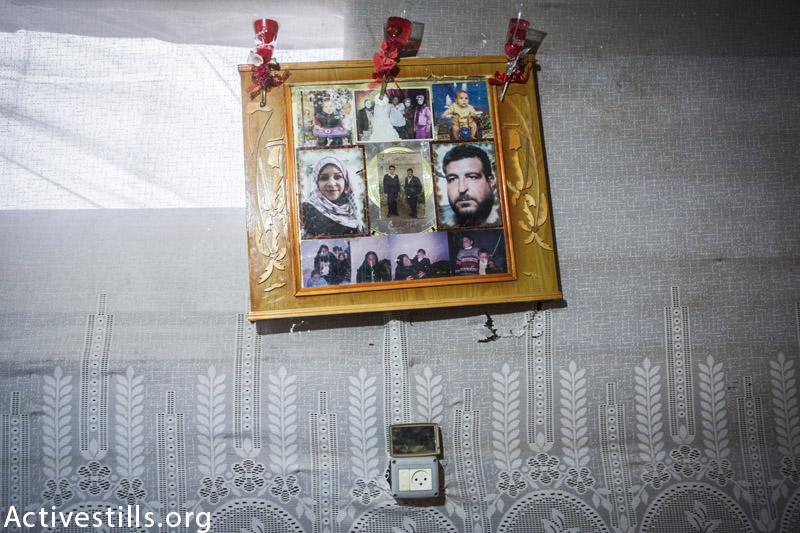
Photos of the members of the family of Zaki Wahdan seen their shelter in Beit Hanoun, northern Gaza Strip, February 18, 2015. Eight members of the Wahdan family, most of whom were women and children, were killed in an Israeli attack in their home on July 22, 2014. The attack occurred after the Israeli soldiers left the home that they occupied and were told to stay inside the house. (Anne Paq / Activestills.org)
The survivors’ suffering is only exacerbated by the fact that many of them are displaced — some still live in the ruins of their own homes — and have little prospect of any kind of justice or even a better future, due to the political stalemate and the siege.
One of the aims of the project is to raise awareness over these families and support their call for justice.
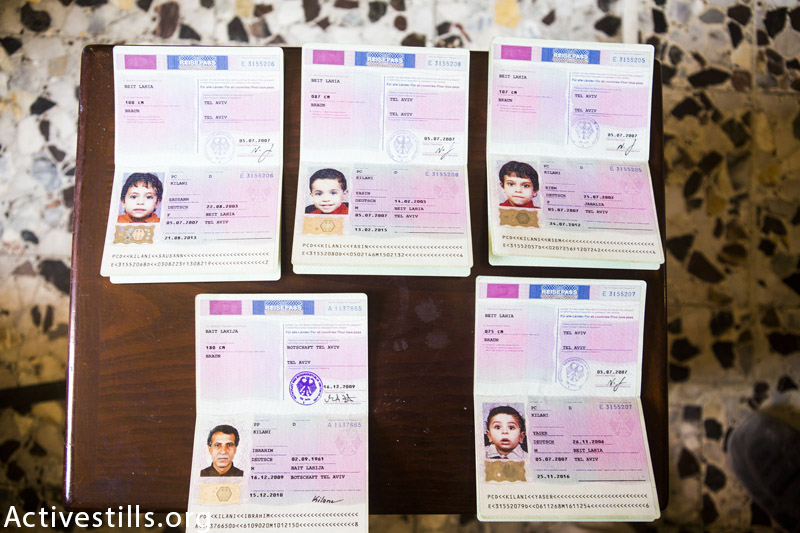
Photos of the German passports belonging to Ibrahim al Kilani and four of his children, seen in their home in Beit Lahiya, Gaza Strip, September 18, 2014. Ibrahim Taghrid was killed together with his wife Taghrid and their five children in an Israeli attack on Gaza City on July 21, 2014. (Anne Paq / Activestills.org)
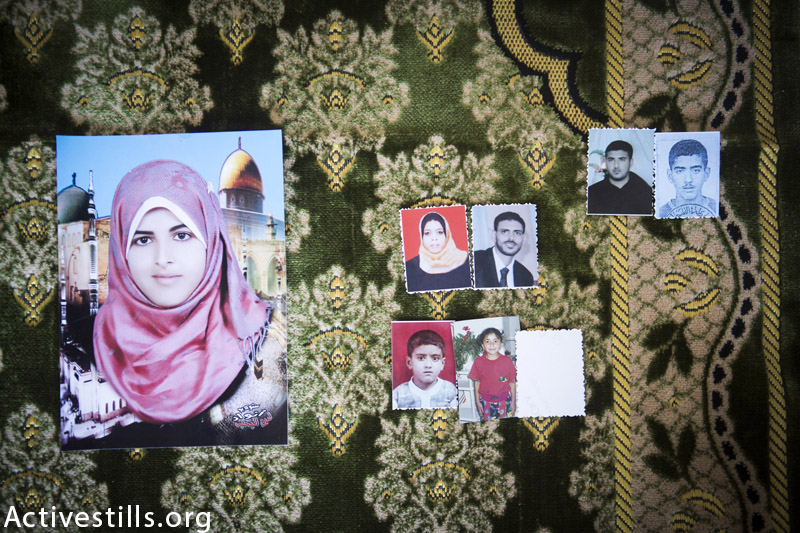
Photos of 7 members of the Al Louh family displayed on the carpet 18-year-old Eman (large photo on the left) was using pray when she was killed, seen on September 16, 2014 in Deir al Balah, Gaza Strip. The attack, which took place on August, 20, 2014, killed eight members of the Al Louh family and destroyed two of their homes. The immediate family of Ra’fat Al Louh (Ra’fat, his wife and their three children) was entirely decimated. Eman Al Louh was hit by a piece of concrete which flew from the window and killed her while she was praying in her home, located around 150 meters from the center of the attack. (Anne Paq / Activestills.org)
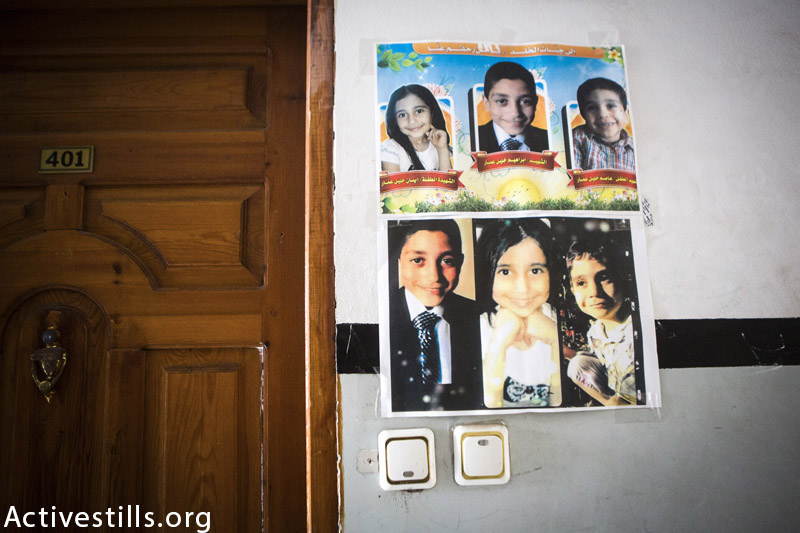
Photos of the three siblings of the Ammar family who were killed in an Israeli airstrike: Eman (9); Ibrahim (13) and Issam Khalil Ammar (4), displayed on the wall next to their door of their flat in the Cordoba building, Gaza City, February 25, 2015. The three children were killed on July 20, 2014 by an Israeli attack on the residential building. In total 11 people from the Ammar and Al Hallaq families were killed. (Anne Paq / Activestills.org)
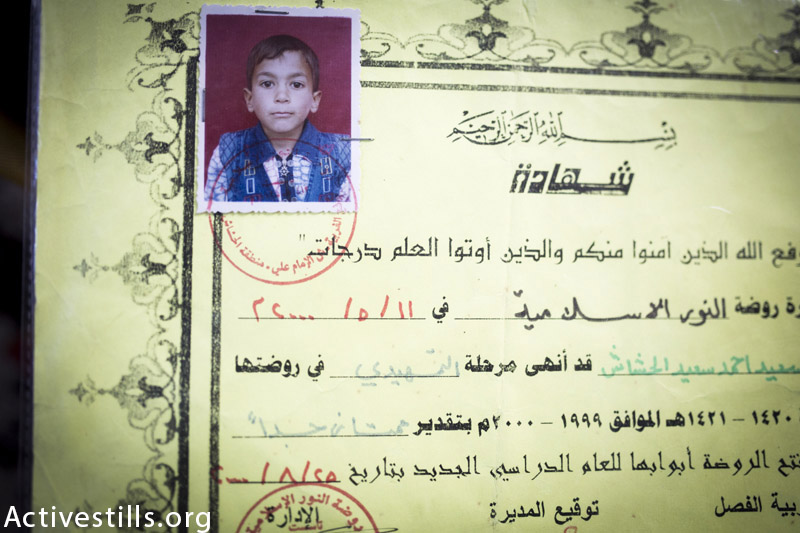
An old photo of Mohammed Al Hashash (who was 20 years old when he was killed) seen on one his school certificates kept by his family in their home in Rafah, Gaza Strip, March 18, 2015. Mohammed was killed together with his four brothers, his mother and one cousin by an Israeli attack on their street as they were fleeing their home on July 29, 2014. (Anne Paq / Activestills.org)
The Activestills photo collective is providing a selection of photos from the ”Obliterated Families” project for download for anyone who wants to expose the issue in their community. So far, street exhibits have been held in the France, Poland, Germany, South Africa, Luxembourg and the United States. These images have yet to be shown in Israel where the victims of the Gaza Strip were mostly excluded from the mainstream media and narrative, making them invisible and easily dismissed.

Photos of the Jouda family killed seen in their garden, where they were struck by a missile fired by an Israeli drone on August 24, 2014. First row, the mother Rawia (43); second row: her children (from left to right), Tasneem (14), Raghad (12), Osama (6), and Mohammed Issam Jouda (8). Two children and the father survived the attack. (Anne Paq / Activestills.org)
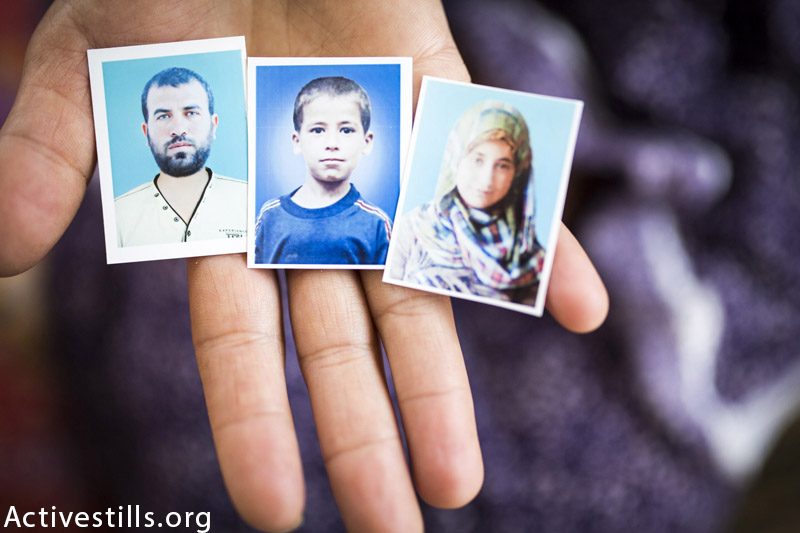
Photos of Radad Ahmed Tanboura, 36, and his children, Ahmed (15) and Amna (13) are held by Radad’s wife, Elizabeth, in the flat where the remaining members of the family currently lives, Beit Lahiya, northern Gaza, March 19, 2015. The attack killed the three members of the Tanbura family on August 25, 2014. Elizabeth was inside the home and was wounded in the attack, while the other children were outside and survived. (Anne Paq / Activestills.org)

Photos of Nabil Siyam’s five children, four of whom died from an Israeli attack on July 21, 2014, seen in the family home, Rafah, Gaza, November 13, 2014. Only Bader (bottom right corner) survived. A total of 13 members from the Siyam family were killed. Around 30 members of the family were fleeing in the street when an Israeli missile hit them. Bader (4) was badly wounded and needed to have his kidney removed, while his father Nabil had his left arm amputated. (Anne Paq / Activestills.org)
Al Mezan Human Rights center will publish the photo galleries on their website, while a web documentary focusing on 10 families — including the Khalili family — is in the works and is slated for release next month. The film’s introduction shows Ismael walking among the ruins of the homes. He walks and looks straight at the camera set on the roof. His gaze still haunts me. I will not forget, nor should any of us.

Photos of Afnan Wesam Shuheebar (8), Jehad Issam Shuheebar (11), and his brother Wassem (8) seen in Afnan’s home in Gaza city, November 17, 2015. The three children were killed during an Israeli attack on July 17, 2015, while the children were feeding birds on the roof of the family’s home. (Anne Paq / Activestills.org)

Photos of seven of the eight members of the Al Khalili family killed during last year’s war on Gaza, laid out at the location on the attack, Gaza Strip, November 12, 2014. (Anne Paq / Activestills.org)
You can follow the project using the #ObliteratedFamilies hashtag.
Related:
UNRWA funding crisis puts 500k Palestinian children at risk
Permanent victims of war: Who remembers Gaza’s children?
A year after Gaza: The only lesson we can draw from Protective Edge

Subscribe to The Landline
+972's weekly newsletter






















